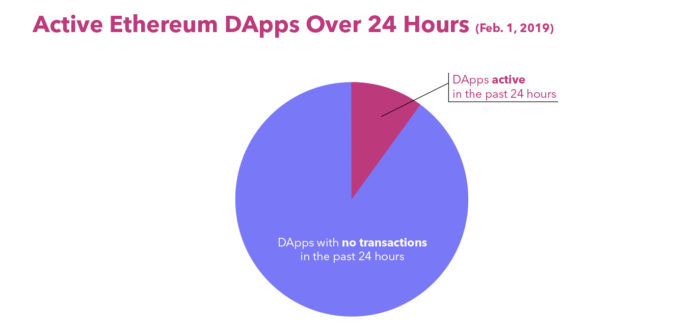[ad_1]
Where’s Ethereum DApp Usage?
Decentralized applications (DApps) were long hailed as one of the leading use cases for blockchain technologies. Through smart contracts, whether it be on Ethereum, EOS, Tron, or otherwise, the worlds’ current processes could be put on a blockchain, thus creating a society built on decentralization.
But as it stands, adoption of such applications has been slim to none. This is far from hearsay, but cold, hard numbers. According to research done by LongHash, a leading crypto information resource, on February 1st, a mere 180 out of 1812 Ethereum DApps had associated ERC-20 transactions. Doing some quick napkin math, this equates to about 10%.
Actual activity statistics only accentuated that DApps aren’t poised to take over the world just yet. Far from. Per the same data set, 13% of the utilized applications had more than 100,000 transactions in the past 24 hours, while 19% had somewhere between 10,000 and 100,000 transactions. Although this isn’t shabby, especially considering the relatively low transactional throughout that Ethereum currently touts, there’s evidently a ways to go.
Although LongHash’s research pertained to data from February 1st alone, the seeming lack of activity on Ethereum applications was cemented by Kevin Rooke, a Canadian crypto researcher & industry commentator.
There are now 1375 live ETH dApps.
86% of them had 0 users today.
93% of them had 0 tx volume today.Across all platforms there are now 1828 live dApps.
77% of them had 0 users today.
85% of them had 0 tx volume today. pic.twitter.com/jUHZYuhPTz— Kevin Rooke (@kerooke) February 10, 2019
Rooke recently took to Twitter to claim that according to DApp Radar, 86% of live applications on the aforementioned blockchain had zero users on Saturday. Moreover, a mere 7% of DApps running on Ethereum had more than zero ETH in transaction volumes over the past 24 hours.
Bitcoin Economist Questions DApp Value Proposition
The quantified lack of adoption quickly catalyzed a response from Saifedean Ammous, the world-renowned author of “The Bitcoin Standard,” an essential industry primer. Ammous, an advocate for Austrian Economics, questioned the value of decentralizing applications, noting that from a brief glance, he can tell that centralizing most, if not all of Ethereum’s on-chain apps would likely be logical.
Rooke somewhat begged to differ, remarking that gambling applications should prove themselves to be of some use, as it is “much more difficult for [the government] to regulate/shut them down.” He added:
Easy for gov’t to come after people running centralized gambling operations. Also open-source code means gamblers can be certain of the odds they’re getting.
Still, Ammous was adamant that even for gambling applications, such as Ethereum Dice and TronBET, it wouldn’t be illogical to use centralized hashing systems for RNG. Case in point, there are handfuls of centralized ‘provably fair’ systems that many gaming websites leverage.
Ammous remarked that governments have a hard time shutting down websites as is, especially due to the ease-of-access that domain providers offer to their clients. He added that “anonymous websites taking Bitcoin don’t have bank accounts,” hinting at his belief that centralized gambling websites that take BTC are just as viable as on-chain Ethereum DApps that accept ETH.
Title Image Courtesy of Descryptive.com via Unsplash
[ad_2]
Source link
